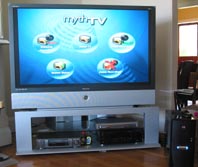 I'm heading up to Cambridge for the Berkman Center's Beyond Broadcast gathering Friday and Saturday. I'll be demoing my MythTV and talking about the technology mandates that could take it and similar disruptive user-driven tech away from us.
I'm heading up to Cambridge for the Berkman Center's Beyond Broadcast gathering Friday and Saturday. I'll be demoing my MythTV and talking about the technology mandates that could take it and similar disruptive user-driven tech away from us.
Though the conference is full, there are plenty of remote participation options. If you're in the area, stop by for Friday evening's alliterative tech fair, Beyond Beta: Demos and Drinks.
The Wall Street Journal runs an amusing feature on computers in the movies: from the improbable email addresses of Mission: Impossible, to the appearance of real nmap screens in the Matrix. Clips, too.
Unfortunately, a good article is marred by a wrong turn on trademark law:
Sometimes, Hollywood depictions look different from reality on purpose. Filmmakers must sidestep delicate trademark issues when setting a scene. Prominently showing an AOL email screen or Google search page, for example, requires approval from the companies, so some production designers create a variation that avoids the red tape. Other times, filmmakers exaggerate the look of money transfers or Web searches with full-screen blinking graphics and sound effects, while removing extraneous details, so that viewers don't miss them in important scenes.
Wrong. Trademark law does not give companies veto power over the depiction of real products, either in documentary or in fiction. That's why when Disney's George of the Jungle 2 showed Caterpillar bulldozers battling George's jungle creatures, to unflattering effect, an Illinois district court denied Caterpillar Inc.'s bid to stop it.
The court found Cat unlikely to succeed on either infringement or dilution grounds ("[T]here is no apparent competition between Caterpillar bulldozers and George 2 videos and DVDs.... Part of what drives the Court's discomfort with Caterpillar's position is the fact that the appearance of products bearing well known trademarks in cinema and television is a common phenomenon. For example, action movies frequently feature automobiles in a variety of situations. Is the mere appearance of a Ford Taurus in a garden variety car chase scene sufficient by itself to constitute unfair competition?") (Example recalled by way of Duke Center for the Study of the Public Domain comics.)
Moviemakers can use the brand-name products their real-life audiences use. They can even insult those products. As Eugene Volokh said at the time of the Disney-Catfight, "So long as the moviemaker doesn't make false factual assertions about someone -- so long as the work is clearly fictional, and not intended to represent any real claims that Caterpillar is somehow committing some crime or misconduct -- the moviemaker's speech is constitutionally and statutorily protected. See, e.g., Mattel v. MCA Records (9th Cir.), the "Barbie Girl" case, speaking about the 'noncommercial use' exception to the Federal Trademark Dilution Act."
If moviemakers aren't using real computer services in their movies, it's either because they are getting bad legal advice, or because mutt and pine aren't so photogenic as animated folding envelopes. I hope it's the latter.